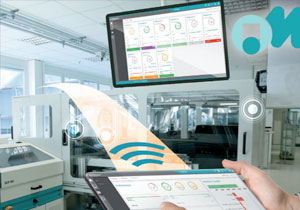
by Jennifer Kohlhepp | CM Magazine Featured
CARD MANUFACTURING SMARTIFICATION: LATEST ADVANCES IN FACTORY AUTOMATION
By Alexander Bauer – Software Engineer, Mühlbauer GmbH & Co. KG
Technology is evolving faster than ever before. Automation and smartification are constantly transforming the world in which we live and every aspect of our daily lives. Similar to the transitions from fixed phones to smartphones and from standard cars to connected, automated cars, Industry 4.0 is the next revolutionary change in the manufacturing industry. Industry 4.0, sometimes referred to as Smart Factory or the Industrial Internet of Things (IIoT), aims to increase automation and facilitate interactions between humans and systems and between systems and the bottom line. The overall goals of Smart Factory are production benefits such as increased efficiency, more transparency and reduced costs.
Smart Data Handling in Industry 4.0
Any human, equipment, process, system or product in your production plant generates data. This data provides valuable information that can be used for your customers’ and your own benefit. Smart Factories collect the data from individual sources, store it and make use of it. In this regard, two factors have to be taken into consideration. First, the data needs to be collected and processed in real time, which succinctly means nobody is interested in yesterday’s newspaper as it is already outdated. Second, the steadily increasing amount of data sooner or later represents a challenge. Manual data collection (e.g. on a piece of paper or an electronic spreadsheet) is error-prone and very often subject to human errors. Only the processing of real-time data allows for total transparency and reveals valuable insights into the production process you would otherwise not get. Furthermore, real-time data provides a competitive advantage.
An Industry 4.0-enabled factory takes systematic methods such as Lean Manufacturing or Six Sigma to a new level, as real-time analytics allow, for instance, the live calculation of performance metrics and the live monitoring of process parameters. The automatic data collection also allows for an analysis of the historical statistical data. This analysis can be based on particular criteria (e.g. by an asset, product or operator) and time frame (e.g. lot, shift, production day, up to a complete year). This is obviously a huge amount of data, especially if all data sources available (e.g. automated optical inspection or pressure or temperature sensors) are taken into account.
Smart Factory Benefits for Card Manufacturers
The manufacturing of a standard banking card involves several different processes such as sheet printing, sheet collating, sheet lamination, card punching, the application of a hologram or a signature panel, card inspection, as well as cavity milling and the embedding of a chip module. In any of these process steps, scratches or other printing defects may occur. An Industry 4.0-enabled Smart Factory would immediately identify these weaknesses in the individual production processes and help improve every single one of them. A sophisticated combination of production and QA data provides an even higher level of traceability. Thus, card manufacturers can quickly resolve warranty claims or, if necessary, address quality issues related to their manufacturing process. These faster response times demonstrate an extremely high level of production transparency that increases customer confidence.
Manufacturing with an Autonomous Intelligent Vehicle
On-demand card manufacturing with lot sizes down to a single card require a well-organized but at the same time leaner material flow. An intelligent factory helps manage and track material flow within the production, even down to a single identifiable unit. In the end, any kind of material, whether it is raw or processed or even a consumable, needs to be transported from one factory location to another (e.g. from the warehouse to a production machine or from one machine to another machine).
In this case, the material handling can be automated with a smart Autonomous Intelligent Vehicle (AIV). An AIV is like a taxi, which goes from one spot to another, and moves freely on the production floor. It does not need any rails or fixed guiding. AIVs are smart because they are self-taught, autonomous machines that can remember alternative routes (in case of stumbling upon any obstacles) and cooperate with human workers in a dynamic, changeable environment. These mobile robots increase throughput, reduce machine idle time, eliminate errors and improve material traceability, so that employees can focus on production tasks that require more complex human skills.
Future Trends in Factory Automation
Another industry trend is the combination of individual processes in production lines. A standalone process like card punching is combined with a follow-up process (e.g. the immediate inspection of cards for defects). Larger production lines already combine card milling, chip embedding, card personalization and packing without any human intervention. The machines are either connected by means of conveyers or are delivered as a combined system. This increased level of automation saves both time and cost, as there is no need for a human operator to move the cards from one machine to the other. However, it is important that these combined systems can still be operated in a standalone mode, which makes them independent from preceding and subsequent processes.
Conclusion
Smart Factory touches all facets of production and transforms the current way of card manufacturing by increasing the level of automation. The intelligent use of available production data combined with technological advances in factory automation fulfills the customer’s requirements for faster turnaround times, local production with short manufacturing distances and cost savings.
About the Author: Alexander Bauer is software manager for industrial software solutions at Mühlbauer GmbH & Co. KG. After completing his studies in computer sciences, he has been working for the company for more than eight years. He develops and deploys solutions in the areas of production and personalization of financial smart cards. He is now particularly focused on optimizing productions and making factories smarter in the field of Industry 4.0.





